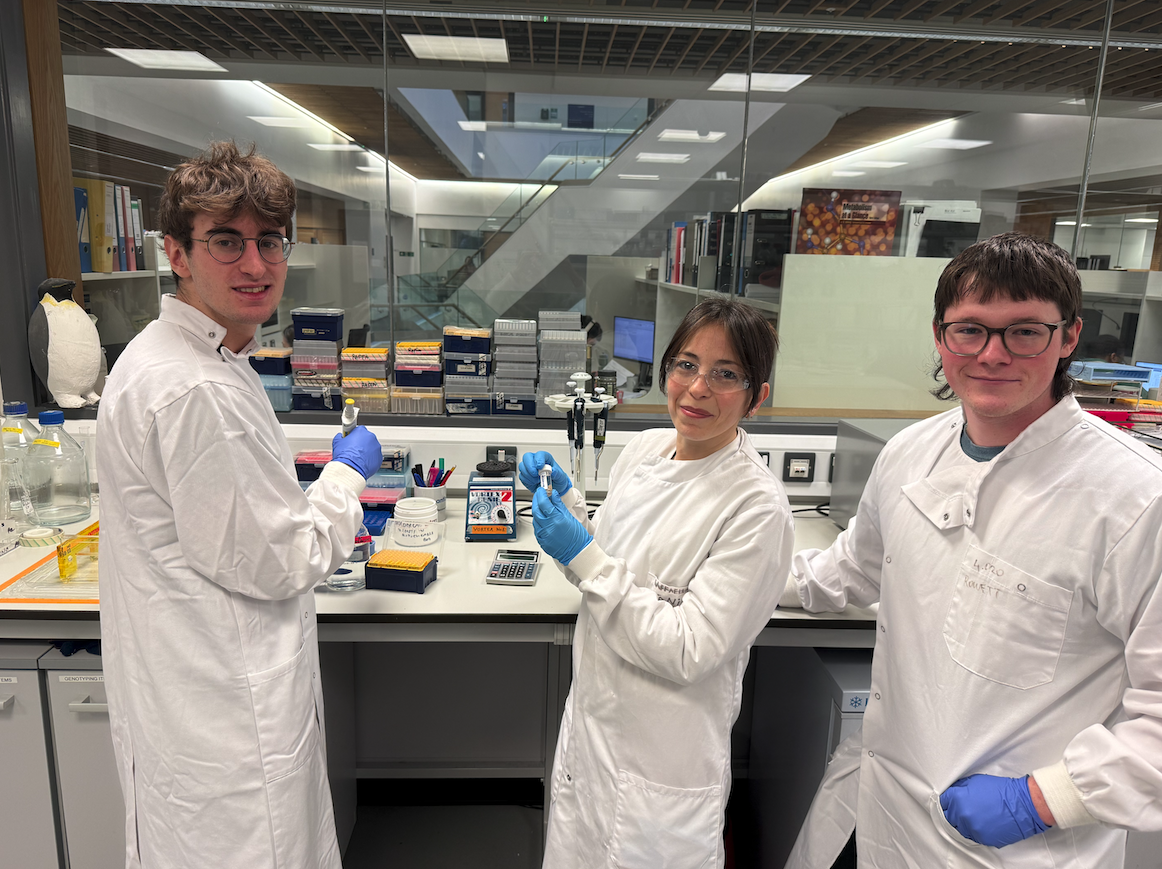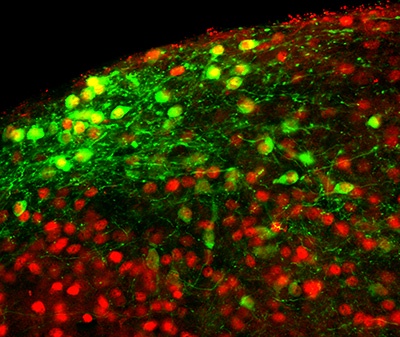
FRSE
Chair in Nutritional Neuroscience
- About
-
- Email Address
- lora.heisler@abdn.ac.uk
- Telephone Number
- +44 (0)1224 437446
- Office Address
Foresterhill
AB25 2ZD- School/Department
- School of Medicine, Medical Sciences and Nutrition
Biography
Professor Heisler investigates brain circuits regulating energy homeostasis in an effort to identify new targets amenable to obesity and type 2 diabetes medications. Professor Heisler received her PhD from Tufts University, USA in 1997 and held postdoctoral positions at the University of California, San Francisco USA and Beth Israel Deaconess Medical Center, Harvard Medical School USA. In 2001, Professor Heisler was promoted to Instructor and set up her laboratory at Harvard. She then relocated her group to the University of Cambridge, UK in 2004 where they worked for the next 10 years. Prof Heisler was a Wellcome Trust Senior Fellow at this time. The Heisler laboratory moved to the Rowett Institute, University of Aberdeen to take advantage of the Institute’s strengths in obesity research, ranging from molecules to man.
News
Recent interview with BBC Scotland and STV about our research.


The MOOMIN (Mechanisms Of Obesity, Metabolism, Insulin Sensitivity and Nutrition) Lab welcomes new PhD student Karo Oghenekaro.

We also welcome Honour's students Leo Gunn and Rhodri Jackson.

Congratulations to PhD student Dhamyaa Al-Halboosi on successfully defending her viva and being awarded her PhD.

Congratulations MSc student In Imogen McMichael on successfully awarded her degree.
Listen to Prof Heisler's interview on the Today Show, BBC Radio 4 18 April 2025.
Read Prof Heisler's various interviews in the New Scientist in 2025.
Sign up to attend the Keystone Conference co-organised by Prof Heisler 'Obesity Therapeutics: Unlocking Benefits and Minimising Side Effects' 26-29 January 2026, Keystone CO USA. https://www.keystonesymposia.org/conferences/conference-listing/meeting/j52026

Memberships and Affiliations
- Internal Memberships
-
Director of Research, Rowett Institute
Aberdeen Cardiovascular and Diabetes Centre member
- External Memberships
-
Deputy Editor, Molecular Metabolism
Scientific Advisory Board, Keystone Symposia
Latest Publications
Mesenchymal-specific Alms1 knockout in mice recapitulates metabolic features of Alström syndrome
Molecular Metabolism, vol. 84, 101933Contributions to Journals: ArticlesLoss of GPR75 protects against non-alcoholic fatty liver disease and body fat accumulation
Cell Metabolism, vol. 36, no. 5, pp. 1076-1087Contributions to Journals: ArticlesGLP-1 receptor agonist improves metabolic disease in a pre-clinical model of lipodystrophy
Frontiers in Endocrinology, vol. 15, 1379228Contributions to Journals: ArticlesA brainstem to hypothalamic arcuate nucleus GABAergic circuit drives feeding
Current Biology, vol. 34, no. 8, pp. 1646-1656.e4Contributions to Journals: ArticlesModulation of GABA release by 5-HT1B receptors: An interplay with AMPA-receptors and voltage-gated Ca2+ channels
Neuropharmacology, vol. 241, 109758Contributions to Journals: Articles
Prizes and Awards
Professor Heisler was the recipient of the Outstanding Scientific Achievement Award (OSAA) from the American Diabetes Association. Professor Heisler received the OSAA prize for her research identifying a new type of medication to improve type 2 diabetes. This prestigious award recognises research in diabetes that demonstrates particular independence of thought and originality. Her career scientific contributions include seminal discoveries in the brain control of appetite and blood sugar that demonstrate her innovation.
Professor Heisler commented: “Diabetes is such a widespread problem and it is crucial that we as scientists continue to research this disease in order to find new ways to combat it. It is extremely humbling to be recognised for our contribution to diabetes research. I work alongside many talented colleagues."
Professor Heisler was also the recipient of the Outstanding Scientific Achievement Award from the Obesity Society for her work defining the therapeutic mechanism of a globally prescribed obesity medication.
She has received similar prizes from other international societies and is regularly invited to give Keynote talks at scientific conferences.
- Research
-
Research Overview
MOOMIN Lab
Mechanisms Of Obesity, Metabolism, Insulin Sensitivity and Nutrition

Our research aims to discover and characterise these brain circuits using cutting edge technology with the objective of locating points within the pathway that are amenable to manipulation with manmade (drug) or natural (hormone) substances.
We also examine the impact of diet and body weight on circuit rewiring and mechanisms restore appropriate system connectivity and activity.
The ultimate aim of our research is to identify new treatments for obesity and type 2 diabetes.


Cells in the brain that impact appetite Our work identifying a new treatment
for type 2 diabetes is on the journal coverCurrent Research
Current projects include:
- Identifying the brain mechanism of action of GLP-1 receptor obesity medications
- Defining how mutations in the orphan receptor GPR75 are protective for the development of obesity, type 2 diabetes and fatty liver disease
- Establishing how factors within the brainstem nucleus of the solitary tract (NTS) control food intake and body weight
- Defining how the brain serotonin circuits control physical activity and energy expenditure and how this circuitry become disrupted with ageing
- Targeting brain serotonin receptors for the treatment of type 2 diabetes
Research team:
- Dr Alasdair Leeson Payne - Research fellow
- Dr Shuwen Mu - Research fellow
- Dr Merve Oncul - Research fellow
- Dr Aurelio Franco Garcia - Research fellow
- Dr Chinmai Patibandla - Research fellow
- Miss Raffaella Chianese - Laboratory Manager
- Miss Dhamyaa Al-Halboosi - PhD Student
- Mr Oghenekaro Iredje, PhD Student
- Miss Imogen McMichael - MSc Student
- Miss Caitlin Gillespie - Honours Student
- Miss Iona Sinclair - Honours Student
- Miss Margaux Chekroun - Honours Student
Funding and Grants
BBSRC
MRC
Diabetes UK
Wellcome Trust
Medical Research Scotland
- Teaching
-
Teaching Responsibilities
Frontiers of Biomedical Science - SM3002
- Publications
-
Page 4 of 6 Results 31 to 40 of 54
Appetite controlled by a cholecystokinin nucleus of the solitary tract to hypothalamus neurocircuit
eLife, vol. 5, 12225Contributions to Journals: ArticlesSex difference in physical activity, energy expenditure and obesity driven by a subpopulation of hypothalamic POMC neurons
Molecular Metabolism, vol. 5, no. 3, pp. 245-252Contributions to Journals: ArticlesPeroxisome proliferator-activated receptor alpha plays a crucial role in behavioral repetition and cognitive flexibility in mice
Molecular Metabolism, vol. 4, no. 7, pp. 528-536Contributions to Journals: Articles5-Hydroxytryptamine Medications for the Treatment of Obesity
Journal of Neuroendocrinology, vol. 27, no. 6, pp. 389-398Contributions to Journals: Literature Reviews- [ONLINE] DOI: https://doi.org/10.1111/jne.12287
A Parabrachial-Hypothalamic Cholecystokinin Neurocircuit Controls Counterregulatory Responses to Hypoglycemia
Cell Metabolism, vol. 20, no. 6, pp. 1030-1037Contributions to Journals: ArticlesLeptin-inhibited PBN neurons enhance responses to hypoglycemia in negative energy balance
Nature Neuroscience, vol. 17, pp. 1744-1750Contributions to Journals: Articles- [ONLINE] DOI: https://doi.org/10.1038/nn.3861
5-HT obesity medication efficacy via POMC activation is maintained during aging
Endocrinology, vol. 155, no. 10, pp. 3732–3738Contributions to Journals: ArticlesDistribution of cells responsive to 5-HT6 receptor antagonist-induced hypophagia
Behavioural Brain Research, vol. 266, pp. 201-206Contributions to Journals: ArticlesDevelopmental Programming Mediated by Complementary Roles of Imprinted Grb10 in Mother and Pup
PLoS Biology, vol. 12, no. 2, 1001799Contributions to Journals: ArticlesProfiling of glucose-sensing neurons reveals that ghrh neurons are activated by hypoglycemia
Cell Metabolism, vol. 18, no. 4, pp. 596-607Contributions to Journals: Articles- [ONLINE] DOI: https://doi.org/10.1016/j.cmet.2013.09.002
